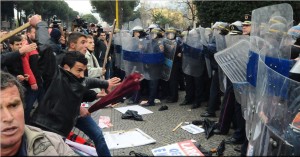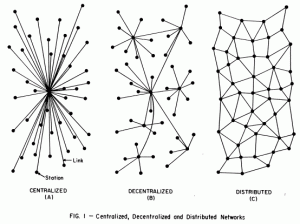

In Emergence, Steven Johnson lays out a network order based in the localized knowledge and reaction base of ant colonies. Quite convincingly, he outlines how these systems can relate to human society, where the potential disorder of the city street can cause chance encounter to generate population interaction and global change. The disconnect is in the way that Johnsons (self- admittedly) founds his argument in unaware units – ants with little ability to reflect on their condition. How can we apply this emergent notion to human systems, where the individual is far more aware?
It is fully true that humans can and do operate in unaware manners – mob mentality and groupthink are examples of when the awareness of the individual breaks down and the local reactive network becomes dominant. People involved in violent protest often report sudden changes in attitude of the mob, an emerging willingness for normal people to begin vandalizing, burning, and tormenting the authorities – to begin to break down the normally accepted rules of operation temporarily, only to return to order later as if they were in a dream state. Unfortunately, these situations tend to be destructive, associated with overthrow of good or bad orders. Rarely are mob situations constructive. Why, then would we want to found a system of order in the part of our social mentality that has well-documented destructive habits?
Military history has shown us the failures of local-authority order. The ancient Romans understood the value of command over groupthink. Battle after battle, the Romans sent disciplined ranks against disorganized “barbarians,” and ended up conquering much or Europe. Of course the weak point exists when a poor strategist is in command, but their structure of command and discipline is one that prevailed for thousands of years. Only recently are modern militaries beginning to see the adaptive value of local command.
The question seems to be one of top-down or bottom-up. We have evidence that top-down approaches tend to be incapable of adaptation or evolution, but our examples of bottom-up order are shown to be highly likely to miss the larger picture. The operative word in this discourse is “expertise.” When a mass of untrained individuals engages in some constructive act, we can’t expect trained discipline to emerge. The opposite is true, that a team of laborers working under the supervision of a singular expert can fail to be adaptive, or comprehensively considerate.
What models can we call on to exemplify a combination of authoritarian and mob orders? I’m not sure I can answer this question (anyone who can might be able to make a killing helping the military develop new command structures).
There is another discussion at play here, which is one of the methods of communication. Clearly, a network of living things is formed by communication, but the issue may be quality or quantity. Johnson’s ants communicate very simply, conveying really only one or two things at a time, and the intelligence emerges from the sheet number of incidental communications that occur in a period of time. Humans, on the other hand, communicate in very complex ways, conveying countless points with each interaction.
Is simple quantity a valid intelligent network? Computers use the simplest communication, just a binary positive or negative, and through millions of interactions, achieve something powerful, but is this, like Johnson’s mention of SimCity, a simulation?